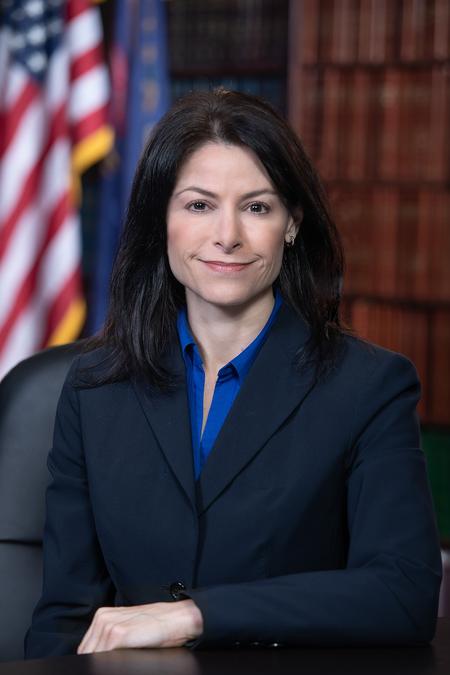Despite Bipartisan Support, Michigan Lawmakers Balk at Funding Criminal Justice Initiatives
The Republican-led Legislature has a habit of touting bipartisan criminal justice reforms, then failing to adequately fund them.

It’s budget season in Lansing, and already it looks like criminal justice initiatives are an early target for the Republican-led Legislature. That’s despite the fact that many of these initiatives were created with bipartisan support.
Among those programs are ones that the Legislature itself created, some quite recently.
Subscribe to MichMash on iTunes, Spotify, Google Podcasts, NPR One or wherever you get your podcasts.
Just last fall, the Legislature passed “Clean Slate” legislation making it easier for people convicted of a crime to have their records expunged. Gov. Gretchen Whitmer’s budget proposal includes $560,000 in the attorney general office’s budget to support that legislation, as well as $1,050,000 in the state police budget. But the current budget bills in the Legislature do not include those appropriations in either the general government or state police budgets.
The governor’s budget plan also includes a fiscal year 2021 supplemental request that includes a much larger $19 million proposal to support coordinated development of criminal record expungement systems in the departments of Attorney General, Corrections, State Police and the Judiciary “that will automatically clear certain felonies and misdemeanors from criminal records.” So there is still an opportunity to support the legislation financially.
But that is not the only program in the attorney general’s office that isn’t getting financial support from the Legislature. Attorney General Dana Nessel recently announced the first exoneration as part of her Conviction Integrity Unit. Nessel created that unit in 2019 to go back and see whether new evidence might exonerate people who were convicted of a crime. It took two years, but a conviction has now been overturned.
Related: Michigan’s Conviction Integrity Unit Investigates Past Mistakes in State’s Prosecution to Learn From Them
Why has it taken two years to get to this point of a first exoneration? Nessel says the process itself can be time-intensive, but she says it also has a lot to do with limited resources.
“I started this office with no additional funding at all whatsoever,” Nessel recently told WDET’s Stephen Henderson on Detroit Today. “And you might know the Legislature, the Republican majorities — not my biggest fans over there, not really interested in funding any new initiatives that I put into the office. So it’s always a process of me trying to figure out when I create a new division, how am I going to come up with the money to fund it knowing I’m not going to get it from the Legislature?”
Nessel says she got grant funding to hire a four-person staff to work full time on these cases. That’s four people to work on, what the office says, 1,300 requests to review old convictions already. It’s also worth noting that Whitmer did not propose any funding for the Conviction Integrity Unit in her first two budget proposals.
That example is one that clearly has a lot to do with partisan politics. But there are more that are more difficult to understand from a political perspective.
“It’s always a process of me trying to figure out when I create a new division, how am I going to come up with the money to fund it knowing I’m not going to get it from the Legislature?” –Michigan Attorney General Dana Nessel
The Legislature passed a law in 2016 that was signed by then-Gov. Rick Snyder to compensate wrongfully convicted people for their time in prison. But since then, lawmakers have continually failed to fund the program adequately. According to The Detroit News, Michigan now needs $7 million to compensate wrongfully convicted people, or that fund will go into debt.

And then, there’s the bipartisan Michigan Indigent Defense Commission. Right now, the Legislature’s budget would cut that commission’s operating budget in half. The Indigent Defense Commission was championed by the most conservative of conservative Republicans when it was created by the Legislature in 2013, with overwhelming support from Democrats as well.
In an email, Senate GOP spokesperson Abby Walls notes that it’s still very early in the budget cycle, and some of these items “are likely to fluctuate.”
“Specifically for the expungement questions, $24 million was set aside in last year’s budget to disperse to the responsible agencies and departments,” she notes.
“As for the wrongful conviction money, that money is appropriated as-needed,” Walls continues. “So when a judgment is handed down, the fund is replenished with the appropriate amount.”
It’s important to note that lawmakers were originally expecting a budget shortfall this budget cycle. But new projections show a large budget surplus. That means there may now be more opportunities to fund these items in the budget if the political will exists.
Overall, Whitmer’s budget proposal would spend over $90 million on various criminal justice reforms. We’ll have to wait and see how much of that remains intact.
More from MichMash:
Michigan’s Top Environmental Regulator Defends New PFAS Standards, Line 5 Permits
Future of Line 5 Uncertain After Enbridge Ignores Whitmer’s Order to Shut Down
Redistricting Commission Needs Michigan Residents’ Help To Define “Community of Interest”
State’s Approach to Unemployment Lawsuit Puts Victims in Limbo
Michigan Needs To Grow Faster. How Can We Attract More People?
Trusted, accurate, up-to-date
WDET is here to keep you informed on essential information, news and resources related to COVID-19.
This is a stressful, insecure time for many. So it’s more important than ever for you, our listeners and readers, who are able to donate to keep supporting WDET’s mission. Please make a gift today.
